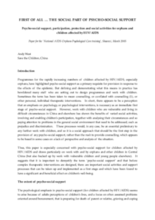Programmes for the rapidly increasing numbers of children affected by HIV/AIDS, especially orphans, have highlighted psycho-social support as a primary requisite for provision in response to the effects of the epidemic. But defining and demonstrating what this means in practice has bewildered many staff who are setting out to design programmes and work with children. Sometimes the term has been taken to mean counselling, or conflated with counselling (1), or other personal, individual therapeutic interventions. In short, there appears to be a perception that an emphasis on psychology, or psychological interventions, is necessary as an immediate first stage of psycho-social support. However, work with children who are vulnerable and living in difficult circumstances in China and elsewhere has shown the benefits of varied social activities, involving and enabling children’s participation, together with analysing their circumstances and so paying attention to problems in the general social environment that need to be addressed, such as prejudice and discrimination. These processes would, in any case, be an essential preliminary to any further work with children, and so it is a social approach that should be the first step in the provision of any psycho-social support, rather than the rush to provide counselling, which appears to be based in some cases on a lack of perspective and analysis of the situation.
Thus, this paper is especially concerned with psycho-social support for children affected by HIV/AIDS and draws particularly on work with and by orphans and other children in Central China (but also backed up by work with vulnerable children and young people elsewhere). It suggests that it is important to demystify the term `psycho-social support’ and that before complex therapeutic interventions are designed, there are important social activities and support processes that can be taken up and implemented as a first stage and which have been found to have a significant and beneficial effect on children’s well-being.
©Save the Children China

